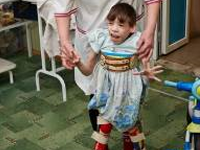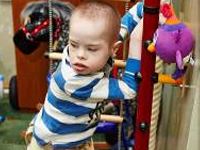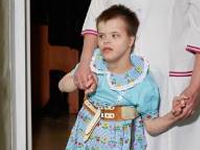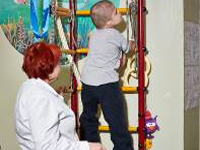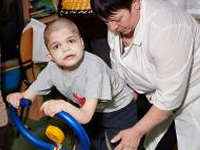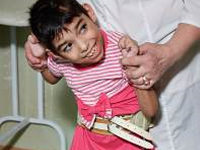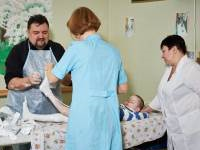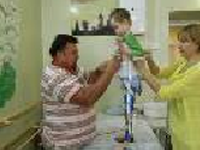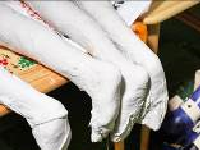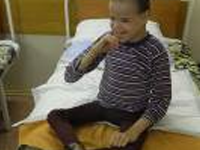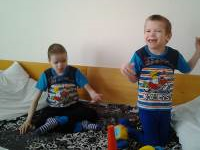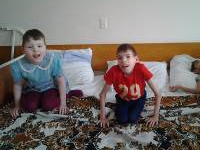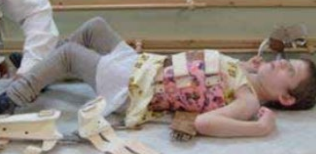
WFCF has funded Diema's Dream Foundation in the Russian Federation for $12,825 in support of the Project Believe - verticalization orthopedic and physical therapy, life skills and social adaptation for orphans living with severe mental and physical disabilities.
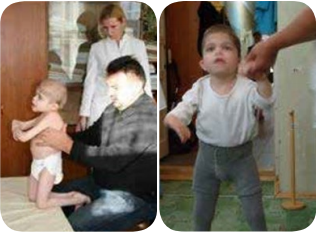
Project Believe is about giving orphans who have multiple and profound disabilities, the courage to believe they can see their world while standing on their two feet. Elat'ma orphanage is located in Ryazan region; 200km South East of Moscow, Russia. The orphanage currently accommodates 96 children ages 2-10 years with severe physical and mental disability. The project is supervised by Diema's Dream foundation located in Moscow, Russia and Arnold, MD. Diema's Dream Foundation was established in 1998 to provide financial, medical, and educational support for both physically and mentally disabled children in Russia. The larger goal is to support changes in society and legislation in order to create social and medical support programs, which would allow parents to raise their children at home rather than living in institutions. For over 16 years, Diema's Dream Foundation has been providing support and care for around 15,000 orphans throughout Russia.
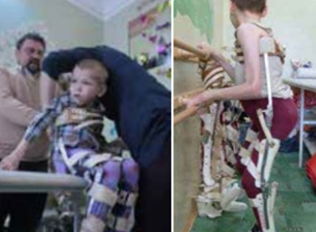
WFCF has proudly provided this support for the Project Believe for the period of 6 months to provide the following services to the children at the Elat'ma orphanage:
- Doctor's orthopedist visit for medical examination
- Manufacturing of orthotics, splints and braces
- Daily massages and physical therapy sessions
- Daily educational, life skills sessions and social adaptation
Andrey A. (2009 born)
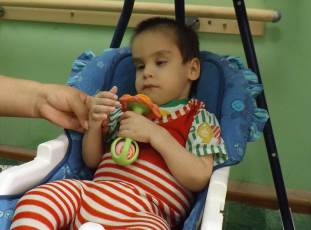
Learned how to walk down the corridor in a baby walker. Reinforced the skill to reach for objects. Now Andrey reaches out not only to the toys with sound, but also shiny toys. She can hold a familiar thing for a minute to consider it while sitting in a wheelchair. She is able to select items from a box and crawl on her hands to get them out of the box. She can shift the toy from one hand to another, producing sounds at the same time. She learned to hold part-time cup of juice and drink from it using both hands.
Kirill D. (1992 born)
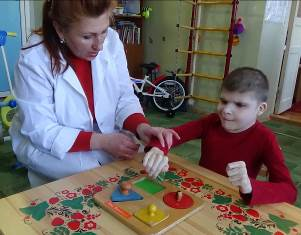
He learned with the help of the tutor to simulate a circular motion by hand on an illuminated board with sand. He is able to take geometric shapes to insert them into a board with the corresponding holes. By repeating the action in three parts he learned to build the tower and collect puzzles. He learned how to choose one of several items. He knows how to use a napkin after eating - he takes it, brings to his mouth and begins to wipe. He is able to imitate and follow the rules in games with other children and to wait patiently for his turn to ride on a swing or a bicycle. After the game, he puts some of the toys in the storage basket He has learned to dress himself.
Dmitriy E. (2002 born)
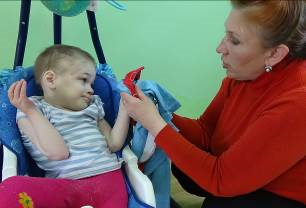
Alex achieved good results: He practiced skills to hold himself in a sitting position and learned to sit in a chair with a lock or in a chair-pear. While sitting on the bed, he rests on his right elbow. He takes objects and throws one toy to take another. Often, instead of toys, he takes the teacher's hand and strokes it! When requested, he can put toys back in the box. He is learning to wash by putting his hands into the water and then puts his hand on his face. Dmitriy learned to clap, repeating the action for an adult and even straightens his fingers. He mastered the ability to drink, holding the cup with one hand with minimal help.
Boris N. (2002 born)
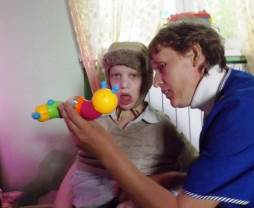
Attention was paid removing Borisi’s emotional stress by using behavioral studies in the multisensory room. Boris calmed down, eagerly watching the LED tube and listening to classical music. After establishing contact with an adult, Boris went outside a lot, often in the playground to ride on the swings and play ball. There was a marked improvement in the child's condition and recovering important life skills: sitting at the table, he eats with a spoon full of food, understands speech addressed to him, he smiles and performs tasks that the teacher requests.
Irina B. (2001 born)
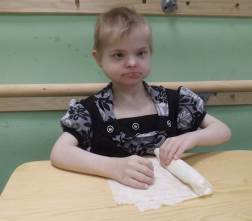
She has been successful in working with the teacher, despite the fact that she has been sick a lot. She walks better, learned to climb stairs and can open a door and step over the threshold. She can grab two fingers on a sheet of paper, folding it in half, as well as, determining the right and wrong sides of garments, to distinguish between large and small items. Ksenia can put on her shoes with buttons with Velcro! She has become more confident in dressing, while adhering to the correct sequence of actions and accurately understands the teacher instructions.
Ivan D. (1997 born)
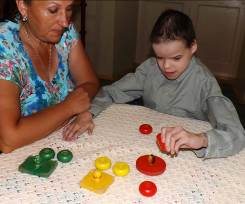
Positive dynamics in Ivan’s development: he learned to fold a piece of paper in half, though not very smoothly; he can determine the right and wrong sides of garments; pick tissue samples with the same structure; do housework for 20-30 minutes. When reminded, he is able to wipe his nose with a handkerchief. He comforts distressed comrades and can express their feelings and explain their desires. He begins to pronounce sounds that resemble some of the names. He mastered the three colors and correlates them with objects. He learned to use a spoon and fork while sitting at the table and learned to assemble and disassemble a button garment.
Nikita C. (2000 born)
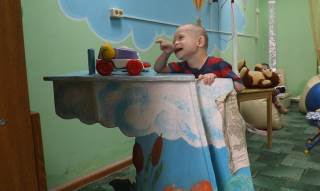
Most of his life spent on bed rest, but in the 15 years he has learned to stand with the support of the wall for 9 minutes, 5-7 minutes standing in the door frame and up to 30 seconds standing alone! He mastered the ability to put things in a box, and often without help to shake the toys out of it. He has learned the ability to remove his socks and pulls them off with his fingers if the teacher holds the sock heel. Nikita learned to put on and take off his cap and already wears it with minimal help. Not immediately, but he learned to play on his own. For 5 to 7 minutes, he willingly takes balls and throws them. He loves to play and sitting at the table with activities.
Igor V. (2005 born)
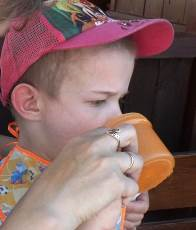
Igor improved his ability to wash his hands under the tap; use the potty; the ability to bite off food and chew it, eat normal food with a spoon (not mashed) food. He learned to eat cheese, bread, steamed vegetables and rice. He became calmer during meals - waiting for the food to be brought to the table. He learned how to confidently hold a spoon and scoop food into it. Although until recently, when the spoon came to his mouth it was empty. Igor already can use his fingers at meal times: he takes pieces of banana, cheese and marshmallows He has eating good habits, can drink 5-6 sips from a cup held by his teacher. He is learning to hold the cup with both hands.
Olga F. (2003 born)
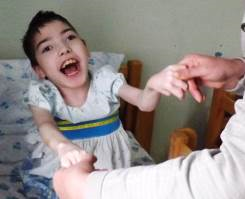
Olga enjoys spending time in the classroom in an interactive pool. She learned to hold the teacher’s fingers, to sit up from a prone position to a seated position; she can sit in a chair-pear and is confident to keep her head up; she can take toys and put them in a box; raise her right hand, showing "what a great girl"; can imitate adults waving a hand not only as a greeting, but also good-bye; can reach for keys of musical toys and click them, making sounds. When seated in a wheelchair, Olga is interested in everything around her. She is practicing the ability to unclench her fingers.
Vera S. (2008 born)
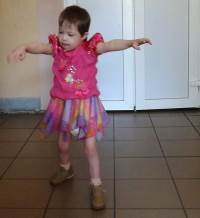
She is confident in acquiring different skills. She has mastered the ability to walk with minimal assistance, and can confidently walk on her own 10 meters. With each passing month, she walks further. She learned the skills of washing her hands and can put them in a bowl of water, soaking them and with a little support their raises her arms and washes her face. She knows how to find a hidden object. For example, a piece of candy or cookies under a transparent plastic cup or with an adult find a toy under the box. She began to respond when her name was called. Vera can even drink from a cup, holding it with one hand, if the teacher gently supports her elbow!
Ivan T. (2006 born)
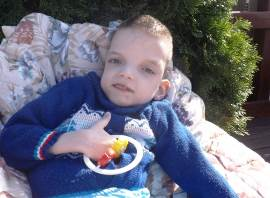
Reinforcement skills of lifting his head and chest while lying on his stomach, leaning on his elbows; he can hold a rattle, and reach for objects, trying to catch them. He practiced the skill to look, raising his head to the side at the sound of musical toys. When the teacher talks to him, Ivan smiles and tries to reach the teacher with his hand. He worked at pulling off the fabric covering an object. Ivan has a difficult time raising his hands and sitting in a wheelchair. With a handkerchief on his head, he begins to twist his head until the handkerchief falls off. Ivan has grown, gained weight and has become cheerful.
Anna M. (1997 born)
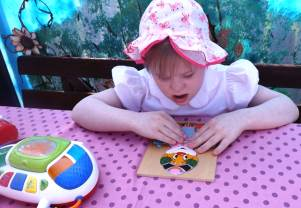
She has achieved much: learning to ride a tricycle; to put together a 9 piece puzzle; to reproduce the sequence of objects using geometric shapes with the image of a steam locomotive; sitting in front of a mirror and comb her hair. Anna can cut soft things with a knife like bananas, marshmallows and bread. She has learned the skill to draw a "+" sign in the sand; put dishes on a tray of dishes and holding kitchen pans. Anna learned to fill a bowl with corn flakes and fill it with milk. She can open a package with the juice, slicing the corner with scissors.
Galya O. (2009 born)
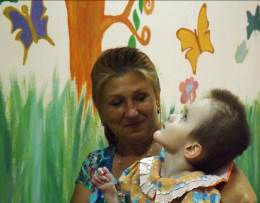
While sitting in a chair-pear, Galya reinforces the ability to reach out to objects to pick them up. She clasps her palm to hold the toy and play with it for up to 5 minutes. Her disease often exacerbates the child, so her state of health is serious. In the classroom the teachers’ pay special attention to the additional food intake. She feeds Galya with a spoon, gently praising the child. She spends a lot of the time in the multisensory room. Galya walked to the teacher, who holds her in her arms and always talking to her. Anna is a happy girl and watches with interest what is happening around her.
Marta W. (2000 born)
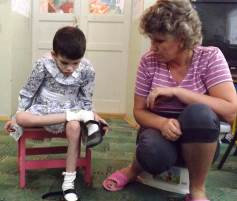
Marta has mastered the skill of looking at a book and looking at the pictures; the request to put 3 cubes on top of each other; after washing her hands, she takes the towel from the teacher and wipes them dry. Also learned to put on her socks without help. Marta fulfills the ability to get out a few toys from the box; to insert 5 round pegs into holes on a board and take off her shoes with Velcro. She learned to roll the ball while sitting on the floor. She can take the ball and rolls it with the help of her teacher.
Irina S. (1994 born)
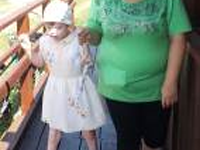
She now has the ability to walk independently: already she can walk with a little help along the corridor, as well as in the playground while holding onto the handrails. She can walk 15 meters by holding onto the ribbon which is held by an adult. She learned to get the pegs into the holes in the board and pick fabric swatches with the same texture – she unerringly prefers fur to sleek material. She can identify large and small objects and especially likes cubes and machines. She is able to put on her socks and even learned to express her feelings – she smiles or cries in a suitable situation and is beginning to understand the emotions of others.
Boris K. (2002 born)
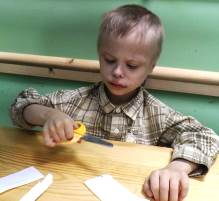
Weakened due to illness, he was often in the open air and successfully developed - lots of walking, repeating the different skills (roll the plastic balls, buttoning buttons on clothing and connecting the two parts. Boris can unmistakably indicate boy or girl; determine a heavy object or a light; he can hold a pencil and he even wear shoes. He learned how to use a pair of scissors. He learned how to wash his hands while on a step stool. He can correlate 2 objects that go together like a spoon and a plate.
Nikolay P. (1999 born)
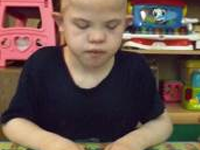
Perfected different skills: can hold a thick pencil and a paint brush; can pick out 4 similar images (dishes, cookies, etc.). He can pick up objects, especially ones that he likes such as cubes. He learned to fold a napkin properly. He began with a little help to fold a sheet of paper in half. With pleasure he worked with a tutor to build a tower of cubes, string rings and beads on a cord, plays with the ball and does a lot of walking.
Oxana I. (2003 born)

Oxana came in a project in 2015 but has already acquired skills in many different fields: With minimal help she could walk for 2-3 minutes and now she can walk 5-7 meters! She listens carefully and with great interest to poetry, looks at the illustrations in books and selects the corresponding objects in the pictures to similar toys (dolls and cars). After she has enjoyed a meal, she wipes her mouth with a napkin. Having become acquainted with the word "yes", its use in speech, she firmly grasps the concept so she eagerly asks adults: "Give me more juice, more candy."
Verticalization Therapy in Elatma Orphanage
Thanks to a donation from the World Forgotten Children Foundation, in 2015 Diemas Dream Fund continued the verticalization of children with severe and multiple disabilities living in Elatomsky orphanage for mentally retarded children in the Ryazan region, Kasimov district.
There are 14 children participating in the project. Every day in the orphanage, 2 assistants engaged with them to develop their limbs - attach and remove their individual orthopedic devices (orthoses, splints, corsets), teach them how to walk with the devices, to stand with support or not - depending on the individual abilities of each child, motivate children in their development and the familiarization of new motor skills for them.
We organized 2 visits with the orthopedic doctors from Moscow in February and August 2015. Doctors conducted a planned check-up of the children to adjust the plan of development of each child, depending on their individual abilities.
As a result, children are actively growing through verticalization. As they grow, their orthopedic devices need to be replaced. Doctors make new molds with casts and then new products are manufactured in Moscow. This year, we made new devices for six children. After trying on the new devices, they are adjusted for the child.
In addition, our doctors have offered hospitalization of several children in the Federal Bureau of Medical and Social Expertise in Moscow. This will ensure that the children receive the most complete rehabilitation, in conjunction with the daily rehabilitation work in an orphanage. These children cannot get the same rehabilitation in Elatma as they would in the hospital. In Elatma it is impossible. And the state now allocates funds for such hospitalization which is good news for the children!
From April to June, 8 children have been thoroughly examined in the clinic, they received the necessary treatment and rehabilitation. All the children had unconditional noticeable positive dynamics. They had markedly decreased muscle spasticity, their neurological conditions were better and they continue to grow and gain weight. They all are confident in walking, standing, learning other motor skills and are developing intellectually.
So, as a result of a complex work of many specialists and the support of philanthropists, we have achieved incredible successes in the development of children! We whole-heartedly thank WFCF for the support of children with severe developmental disabilities!
Yours faithfully,
Elena Volodina
Director of Diemas Dream Fund

